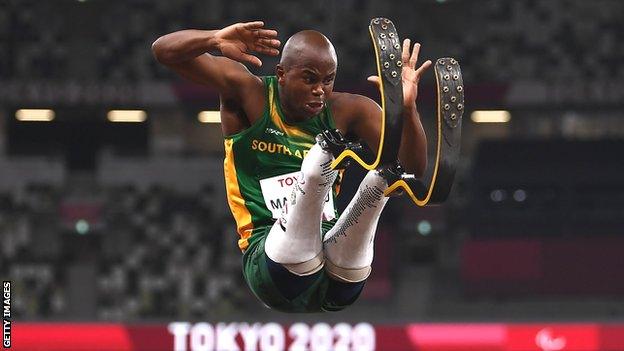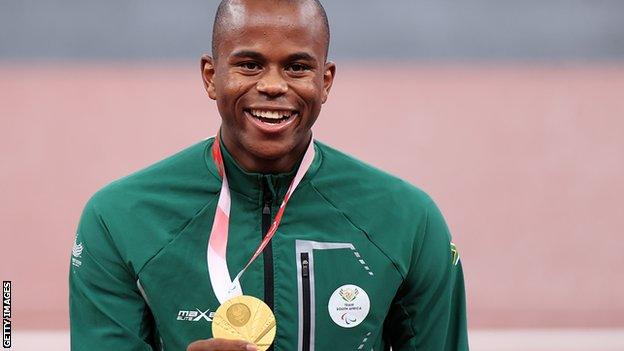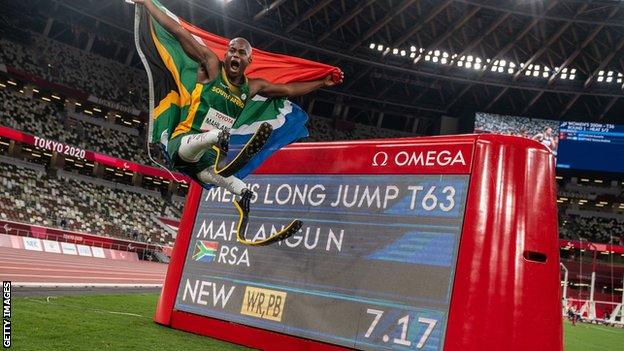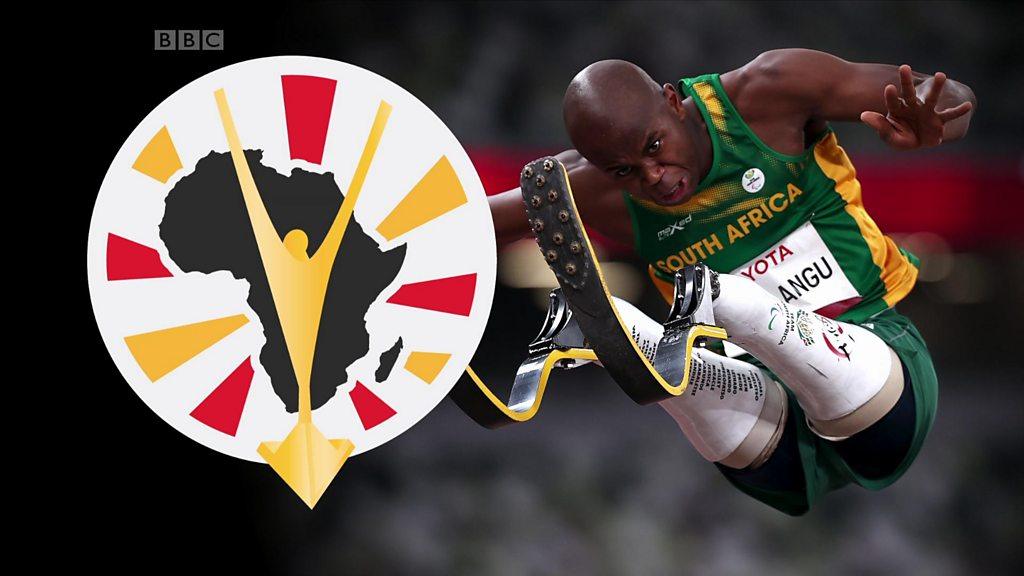Ntando Mahlangu: 'I was bullied a lot because of my disability'
- Published

Living with fibular hemimelia, a congenital condition that causes the lower leg to under-develop, is a major challenge on its own, so imagine being bullied while growing up in an unsuitable town at the same time too.
If one does, one begins to appreciate the mental strength of South African Ntando Mahlangu, who secured two gold medals at this year's Paralympics.
Although he faced difficulties as a child, the 19-year-old, who claimed gold in the 200m and long jump - with a world record leap - in Tokyo, has managed to achieve sporting success few can dream of.
He grew up in a wheelchair in the rural town of Tweefontein, an hour's drive from the capital Pretoria.
"Being a disabled child in South Africa, in Africa, is not easy," Mahlangu tells BBC Sport Africa.
"I was bullied a lot because of my disability but I had to overcome that and stand up for myself, which I did a bit later on in my life.
"That was one of my challenges. Another was getting my first blades and having to walk on them."
As with so much in his life, the BBC African Sports Personality of the Year nominee has managed to make light of such issues.
Knife-edge decision
BBC ASPOTY 2021: Ntando Mahlangu
Mahlangu's coach Neil Cornelius believes his charge can be one of the best para-athletes ever, but it could have all been very different.
"At first, I wanted to play soccer," he explains.
"I love soccer but with the circumstances I was given, I couldn't play the sport, so I had to change direction. I was introduced to athletics in 2014 - I tried it and I loved it."
Just two years later, Mahlangu - then just 14 - won the first of his three Paralympic medals when taking silver in the T42 200m event at Rio 2016.
It represented a remarkable turnaround from the biggest decision of Mahlangu's life when, in 2012, the then 10-year-old had to choose whether or not to amputate both his legs at the knee.
"I got amputated in May and in September, I got my first pair of [prosthetic] legs - that transition was very easy, the decision [was not]," he recalls.
"I took that decision very early on, knowing what I was in for. Emotionally and mentally, I was very young and when they asked me to amputate my legs, I was like, 'why not?'
"I was very young so I just took rash decisions, but those rash decisions I don't regret because look at where I am today. I'm very happy."
Just four months after his life-changing experience, Mahlangu received his first set of blades through the South African charity Jumping Kids - and he has not looked back.
"When I got the opportunity to walk again, I took the decision that I would make the best of it. Fast forward to today, and I definitely think I made the most out of the situation - I think it was a sweet transaction."

Jumping to it
Mahlangu's climb up para-athletics' ladder of success was swift, having shown lots of early promise.
In 2015, he won the 200m and 400m T42 at the International Wheelchair and Amputee Sports (IWAS) Junior World Games.
A year later, he won four gold medals at the IWAS Under-23 World Games, where he was crowned 'Best Athlete'.
2016 was also when he performed in Rio where he became the youngest South African to ever stand on an Olympic or Paralympic podium after his 200m silver, having set an African record in the process.
As Tokyo 2020 loomed, Mahlangu's mental strength was challenged yet again.
For a revision of the classification system by the International Paralympic Committee meant the teen had to move to a class where he could only contest the 200m and the long jump.
The latter was not a sport he practiced but after coach Cornelius agreed to his request to get him ready in just six weeks, both set their sights on improbable glory.
The unexpected gold was thrillingly sealed when Mahlangu, lying in the bronze medal position ahead of his final jump, flew 7.17m to claim gold.
"I have to take you back to the beginning of the jump," he explains. "I just had a moment with myself, took everything in and said 'This is the last jump - it has to happen'.

"To jump a world record and to go to first place, I think it's the greatest jump I've ever seen in long jump history," rallies an individual more accustomed to stressing humility.
Four days later, he blitzed the men's 200m.
"There was nothing more special than when I got the 200 medal and there were two golds - that was a highlight of my life," he said.
As he returned home to a hero's welcome at Johannesburg's international airport after Tokyo, Mahlangu might have been forgiven for reflecting on the vagaries of fate.
For as he was revelling in glory, so the community in Tweefontein was protesting against its poor water supply.
It was this very lack of resources that meant his hometown could not accommodate a student in a wheelchair, meaning Mahlangu was enrolled at a better school in Pretoria.
The move boosted his development as both an athlete and a student and as he completes his school-leaving exams, the star Paralympian is looking beyond athletics at a job in finance.
While such a career may lead to wealth that was once unimaginable, so his sporting career continues to take him to a very different world - one which is truly priceless for the youngster.
"The freedom of movement is definitely something I like when I'm on the track," he explains. "Athletics makes me feel free."
Related topics
- Published8 December 2021
